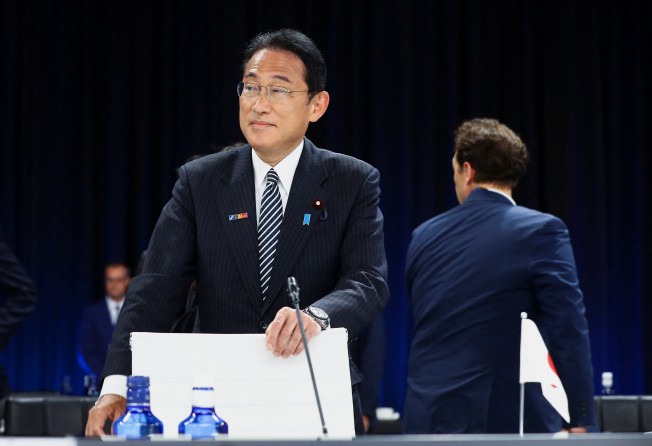
01:41
Japan, Australia to share intelligence on ‘China’s intentions’ under new security pact

Japan’s involvement in a Nato cyber defence platform is a concern for China and reflects the growing importance of cybersecurity in Tokyo, according to analysts.
The assessments follow Japan’s announcement on Friday that it would join Nato’s Cooperative Cyber Defence Centre of Excellence, a platform meant to help alliance members and their partners better protect themselves against cyber attacks.
Japan joins South Korea and Australia to become a contributing member of the platform, which is sponsored by 29 Nato members and involves nine other nations.
The decision comes as Tokyo aligns closer with the Western military alliance to counter China in the Indo-Pacific.
Representatives from Asia-Pacific countries South Korea, Japan, Australia, and New Zealand were invited to Nato’s summit for the first time, and in June, Nato named China as a “challenge” to the alliance – again for the first time.
Tokyo’s announcement drew criticism from Beijing, with foreign ministry spokesman Zhao Lijian urging Japan not to conduct activities that would undermine regional peace.
Zhao also questioned Nato’s motives in strengthening ties with Asia-Pacific nations.
“The Asia-Pacific region is not the geographic domain of the North Atlantic, and there is no need to establish an ‘Asia-Pacific version of Nato’,” he said on Monday.
“What we have seen is that in recent years, Nato has continuously strengthened its ties with Asia-Pacific countries. What is Nato’s intention?
“The international community, especially countries in the Asia-Pacific region, should maintain a high degree of vigilance.”
Zhang Baohui, a Lingnan University professor who specialises in East Asia relations, said Nato’s increased security cooperation with Japan was “worrisome for China”.
“This move by Japan to join the Nato cyber defence centre is part of the Japanese Nato strategy,” Zhang said.
“The motive is to bring in additional balancing forces to deter China from policies or actions that may harm Japan’s national interests.”
In a draft cybersecurity strategy last year, Japan named China, Russia, and North Korea as cyber threats to the country.
Cybersecurity has been given more focus under Japan’s ambitious plan to “fundamentally” strengthen its defences in the next five years, with Tokyo identifying it as one of seven “pillars” for funding in its US$40.4 billion defence budget for fiscal year 2023, its biggest ever.
Japan’s military also plans to increase the number of cyberdefence personnel in the country’s newly established cybersecurity command from 890 now to around 5,000 by 2027.
Bart Hogeveen, head of cyber capacity building at the Australian Strategic Policy Institute’s International Cyber Policy Centre, said Japan’s involvement in the Nato platform was part of a “mutual effort to strengthen ties among like-minded allies and partners in deterring malicious state activities in cyberspace and protecting a rules-based order, also in the digital domain”.
Yoichiro Sato, an Asia-Pacific studies professor at Ritsumeikan Asia Pacific University in Japan, said the participation pointed to the elevated significance of cybersecurity in Japan’s security priorities.
“More resilient Japanese cyber defence will enhance the country’s self defence and concurrently enable closer collective defense with its allies,” Sato said.
“Japan has expressed its willingness to join the ‘Five Eyes’ defence intelligence sharing with the Anglo-American countries. Joining the Nato cybersecurity cooperation can serve as a good stepping stone towards this objective.”
The US has led its allies in accusing China of carrying out cyberattacks around the world, including on Microsoft last year. It has also tightened its grip on exports of chips to China to target its hi-tech sector.
China hit back in September, accusing the US National Security Agency of conducting “thousands of cyberattacks” on its Northwestern Polytechnical University, a well-known institute for aerospace and aviation research.